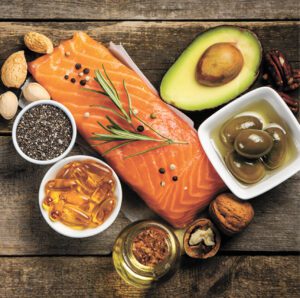By Bo Martinsen, MD
 According to the National Center for Health Statistics, fish oil is the most commonly used non-vitamin, non-mineral supplement in the USA. But just as omega-3 fish oil has grown in popularity, so has the misinformation and confusion surrounding this powerful nutrient.
According to the National Center for Health Statistics, fish oil is the most commonly used non-vitamin, non-mineral supplement in the USA. But just as omega-3 fish oil has grown in popularity, so has the misinformation and confusion surrounding this powerful nutrient.
Let’s clear up some common myths about omega-3s, focusing particularly on source and benefits.
Myth #1: All Omega-3 Sources Are Equally Beneficial
From salmon to flaxseed, chia seeds, and walnuts, popular health websites and magazines often claim that there are plenty of ways to get these essential fatty acids. But not all of these omega-3 sources provide the same value.
When we talk about omega-3s, we’re talking about a family of fatty acids. Of the foods we commonly eat, only fatty fish (and breast milk for babies) contain the full range of the omega-3 family, including the best-known EPA and DHA molecules.
Plant sources, in contrast, contain only one type of omega-3: ALA.
Relying exclusively on ALA-based foods for your omega-3s has several problems. 1) Almost every clinical study showing omega-3 benefits has focused on EPA and DHA from fish and fish oil. 2) For a long time, it was believed that people had the ability to synthesize EPA and DHA from ALA-based foods. More recent research, however, shows that the conversion rate of ALA into EPA and DHA is so low that it’s inconsequential for most people.
This is why eating fatty fish or taking a quality fish oil supplement is a far better method of getting omega-3s than sprinkling flaxseed into your oatmeal.
Myth #2: Eating Fish Is the Best Way to Get Your Omega-3s
Eating fatty fish is a wonderful way to increase your omega-3 intake. But today, there is a clear discrepancy between this often-heard recommendation and reality: An estimated 95% of Americans do not get enough omega-3s from their diet.
There are many factors that contribute to this diet deficiency. Many people say they don’t eat fish because they follow a vegetarian or vegan diet, are unsure of how to prepare seafood, feel like they can’t afford it, or don’t care for the taste or texture.
But even for those who eat seafood regularly, it can be challenging to get enough omega-3s from diet alone. Some of the most popular seafood options — like shrimp or tilapia — contain almost no omega-3 fatty acids. In addition, other factors — like whether the fish was farm raised and the cooking method – can significantly impact the omega-3 content. Consider, for instance, a 2016 BBC report, which found that over a five-year period, the omega-3 levels in farmed salmon shrank by 50% due to changes in the fish feed!
This is all to say, if you are like most Americans, you likely are not getting enough omega-3s. If you think you might be consuming a sufficient amount of these fatty acids, you can take an omega-3 index test to find out your current levels.
Myth #3: Fish Oil Tastes and Smells Fishy
Just like truly fresh seafood, fresh fish oil actually has no fishy taste or smell. If it does, it has started to go rancid and should be discarded.
Besides tasting and smelling bad, excessively rancid fish oil is likely toxic. In animal studies, consuming rancid oil has been linked with organ damage and atherosclerosis. Other researchers have found that oxidized fatty acids may have a pro-inflammatory and mutagenic effect, may negatively impact cholesterol levels, and more.
To determine whether your omega-3 supplement is rancid, break open the capsule to taste and smell the oil inside. You can also measure an oil’s rancidity level by looking at its oxidation values.
Myth #4: The Benefits of Fish Oil Are Too Good to Be True
If a nutrient can influence chronic pain, dry eyes, cognitive function and more, it’s got to be too good to be true, right?
Omega-3s are researched for a broad range of health issues because these nutrients are critical for the proper functioning of every cell in our body. They enhance the fluidity and permeability of the cell membrane; they influence cell signaling and gene expression; they help control the body’s inflammatory response; and more research is coming out showing how these fatty acids support the endocannabinoid system and microbiome.
It’s estimated that omega-3s are involved in more than 10% of all cellular metabolic actions. No wonder high quality fish oil can produce such varied, widespread effects in the body.
For the full article and references, please visit:
https://omega3innovations.com/blog/12-myths-about-omega-3-fish-oil/
Bo Martinsen, MD
Dr. Martinsen is an omega-3 specialist, innovator, and advocate for natural foods. As co-founder and CEO of Omega3 Innovations, he has created several medical food products that combine effective doses of omega-3s with fibers and other nutrients. Before Omega3 Innovations, Dr. Martinsen practiced medicine in Norway for 20 years.
941.485.4400
 Central Florida Health and Wellness Magazine Health and Wellness Articles of the Villages
Central Florida Health and Wellness Magazine Health and Wellness Articles of the Villages



